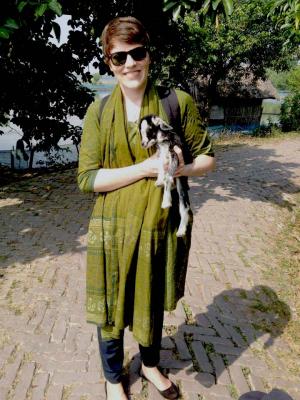Tell us about your experience at UQ.
Why did you choose to study in the Humanities and Social Science at UQ?
I had initially been studying journalism at a different university, but I found we weren't given enough opportunities to learn and think critically about the world we were expected to report on. I was interested in learning about ways to address inequality, poverty, and the impacts of capitalism and colonization. After learning from a friend that Social Science and Development studies existed, I knew I'd found the right degree for me.
What was the best thing about your program at UQ?
The best thing about this program are the skills in critical analysis and ethics that we developed as students - we were taught how to think critically about the causes and solutions to social issues, by looking at power, social structures such as gender, class and race, and the impacts of capitalism and colonization. I feel I have a body of knowledge, theory and ideas that I can apply to any problem.
The Social Science degree also gave a us existing opportunities to put our learning into practice - I did an internship with the Queensland Ambulance Service, and a project with Friends of the Earth. These experiences were invaluable in applying for jobs and future opportunities.
What were your standout achievements at UQ?
After completing my degree, I went on to do an Honours year. I looked at the impacts of backyard food gardening for communities looking to address climate change. I interviewed activists and took part in backyard 'perma-blitzes' as part of this research. It was an incredible opportunity to craft and carry out my own research project for the first time.
What did your study lead to?
How did your study help you to get to your current role, and what does your current role involve?
After Honours, I had the opportunity to go to Bangladesh as part of the AYAD program (now called the Australian Volunteers Program). I spent a year working for CARE Bangladesh doing research and monitoring and evaluation work. I was able to draw on the research skills I had learned in my degree to support the work CARE was doing.
This inspired me to do a PhD, looking at community responses to climate change in Bangladesh. I worked with women farmers to explore how climate change was impacting them and their work, and how they, along with their communities and local NGOs, were responding. I had the opportunity to write papers and present at conferences globally.
While doing my PhD, I had the opportunity to get involved in a number of student organisations, including the Social Sciences Association, and the UQ Student Union as Environment Officer, and I spent a year as the postgraduate representative on the UQ Academic Board, advocating for students. I also had the opportunity to teach and lecture in a number of Sociology classes, sharing ideas with new cohorts of inspiring Social Science students.
After this, I represented the Greens in a Queensland state election. The knowledge, skills and analysis learned during my degree were invaluable in feeling confident in presenting bold ideas about housing, development and planning to the community, and in organising teams of volunteers during the campaign.
My current role is Community Research Officer with the Ipswich City Council. This role involves in-depth, face-to-face engagement with the Ipswich community, talking with residents about issues and concerns to help guide council decision-making. While challenging at times (while I have worked here, the council has weathered a major corruption scandal), I feel a lot of the skills and knowledge learned during my degree have helped my advocate for the community. Everyday I'm drawing on research, presentation, facilitation and negotiation skills that I learned in my degree.
What advice would you give to students in the same discipline you studied?
Enjoy the opportunities you have during your degree for reading, thinking and talking with your peers. Take any opportunities you have for volunteering and getting involved with student organisations and the student union. These extra-curricular opportunities with enrich your learning, give you changes to put your studies into action.
Make connections with your peers and lecturers. Set up reading groups, organise movie nights, go to social events, and make friends. Many of the personal and professional connections you'll make with people at university will last long after you graduate.
What are your future career goals?
My future career goals are to continue in research and engagement, and to expand into community organising, campaigning and activism.

